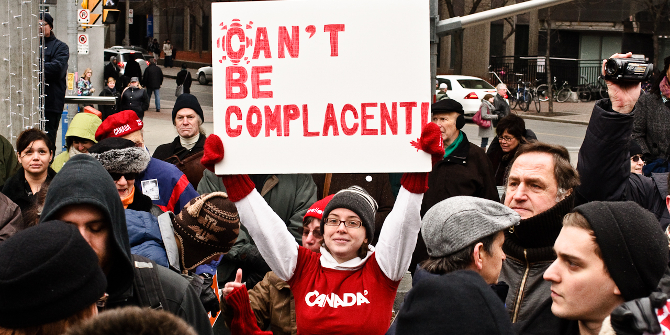 Current polling shows Donald Trump behind in the 2020 election race. In this Q&A, LSE US Centre Director Professor Peter Trubowitz talks on how Trump’s response to the COVID-19 pandemic is hurting him in his traditional base of rural America, and how he might continue to attack China to deflect blame away from his poor record.
Current polling shows Donald Trump behind in the 2020 election race. In this Q&A, LSE US Centre Director Professor Peter Trubowitz talks on how Trump’s response to the COVID-19 pandemic is hurting him in his traditional base of rural America, and how he might continue to attack China to deflect blame away from his poor record.
Is the pandemic cutting into Trump’s base?
America is suffering from a national leadership deficit, which is clearly evident in the polls. A Washington Post-NBC poll yesterday showed former Vice President Joe Biden leading Trump by 15 points, 55 to 45. What really caught my eye in the poll though is what is happening to Trump in rural America — his vaunted base. Trump’s once commanding 47 percent lead there has fallen to 18 points and you don’t have to be a rocket scientist to understand why: those voters are now in the areas that are being hit hardest by the surge of COVID-19 cases in the US. This is what has been driving Trump’s polling deficit, and it now appears to be cutting into his political base.
What will Trump do to close the polling deficit?
Look for Trump to try to deflect blame toward everyone and anyone for the pandemic. And you can bet your bottom dollar that China will be singled out. Why? Because in many voters’ minds China was already seen as a threat to American jobs. Since the outbreak of the pandemic, their views of China have become even more negative. According to a recent Pew poll, roughly two thirds of Americans now hold a negative view of China. This has not been lost on Trump. It was clear in his press conference last week announcing the end of Hong Kong’s favored trading status with the US in response to China’s harsh new security law in the city. He attacked China for its human rights violations in Hong Kong, and in Xinjiang province too. And in case the point was lost on any American voters, he also attacked Joe Biden, arguing that the former Vice President was in Beijing’s pocket. You can count on hearing a lot more from Mr. Trump about China in the coming weeks of the campaign.
Can Democrats take the Senate?
One election story flying below the radar is the tightening Senate races. Six months ago, Republicans looked certain to hold on to their 53 to 47 majority. This is no longer a sure bet. Races that were competitive, like those in Maine and North Carolina, are rapidly trending Democratic. We see a similar pattern in Arizona and Colorado. This has already led to an upsurge in Democratic fundraising. Whether it leads Republican candidates to start “socially distancing” themselves from Mr. Trump remains to be seen. That will be a tell-tale sign of likely Democratic gains.
- This article is based on interview comments Professor Trubowitz gave to Bloomberg on 20 July 2020.
- Featured image: TRUMP barn by Dan Keck is Public Domain.
Please read our comments policy before commenting
Note: This article gives the views of the author, and not the position of USAPP– American Politics and Policy, nor of the London School of Economics.
Shortened URL for this post: https://bit.ly/3jmaNSV
About the author
 Peter Trubowitz – LSE US Centre
Peter Trubowitz – LSE US Centre
Peter Trubowitz is Professor of International Relations, and Director of the LSE’s US Centre. His main research interests are in the fields of international security and comparative foreign policy, with special focus on American grand strategy and foreign policy. He also writes and comments frequently on US party politics and elections and how they shape and are shaped by America’s changing place in the world.






